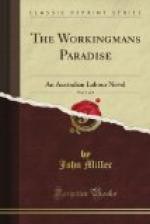“She’s a music-teacher.”
“They’re all clever, aren’t they?”
“Yes. But, of course, they’ve all had a chance. Ford is the most remarkable. He never got any education to speak of until he was over 20. The Strattons have been born as they live now. They’ve had some hard times, I think, from what they say now and then, but they’ve always been what’s called ‘cultured.’ Everybody ought to be as they are.”
“I think so, too, Nellie, but can everybody be as well off as they are?”
“They’re not well off, I told you, Ned. If they spend L5 a week it’s as much as they do. Of course that sounds a lot, but since if things were divided fairly everybody who works ought to get far more, it’s not extravagant riches. Wine and water doesn’t cost more than beer, and the things they’ve got were picked up bit by bit. It’s what they’ve got and the way it’s put that looks so nice. There’s nothing but what’s pretty, and she is always adding something or other. She idolises Art and worships everything that’s beautiful.”
“Do you think it’s really that sort of thing that makes people better?” said Ned.
“How can it help making them better if their hearts are good? When what is ugly and miserable in life jars on one at every turn because one loves so what is harmonious and beautiful, there seems to me to be only one of two things to be done, either to shut your eyes to others and become a selfish egotist or to try with all your strength to bring a beautiful life to others. I’m speaking, of course, particularly of people like the Strattons. But I think that hatred of what is repulsive is a big influence with all of us.”
“You mean of dirty streets, stuffy houses and sloppy clothes?”
“Oh! More than that. Of ugly lives, of ugly thoughts, of others, and ourselves perhaps, just existing like working bullocks when we might be so happy, of living being generally such a hateful thing when it might be so sweet!”
“I suppose the Strattons are happy?”
“Not as happy as everybody might be if the world was right. They understand music and pictures and colouring and books. He reads science a lot and paints—funny mixture, isn’t it?—and she teaches the children a great deal. They go boating together. They both work at what they like and are clever enough to be fairly sure of plenty to do. They have friends who take an interest in the things that interest them and their children are little angels. They aren’t short of money for anything they need because they really live simply and so have plenty to spend. And, then, they are such kind people. She has a way with her that makes you feel better no matter how miserable you’ve been. That’s happiness, I think, as far as it goes. But she feels much as I do about children. She is so afraid that they will not be happy and blames herself for being selfish because other people’s children never have any happiness and would do anything to alter things so that it would be different. Still, of course, they have a happy life as far as the life itself goes. I think, the way they live, they must both feel as if they were each better and knew more and cared for each other more the older they get.”




